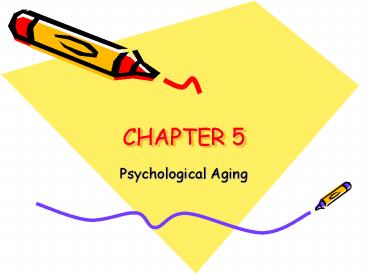Psychological Aging - PowerPoint PPT Presentation
1 / 18
Title: Psychological Aging
1
CHAPTER 5
- Psychological Aging
2
PERSONALITY
- Studies and work on personality indicates there
is little change in personality in some
individuals. - more than any query, studies of personality in
adulthood and aging have been dominated by the
straightforward question, Does personality change
as people grow older, or is it stable?
3
Developmental Tasks
- Developmental tasks define the things an
individual needs to accomplish, adjustments to be
made, and problems to solve.
4
Havighurst DuvallDevelopmental Tasks of Aging
- Adjusting to decreasing health and physical
strength - Adjusting to retirement and reduced income
- Finding meaning in life
- Maintaining satisfactory living arrangements
- Finding satisfaction w/in the family
- Adjusting to the reality of death
- Accepting oneself as an aging person
5
Eriksons Developmental Tasks of Aging
- Ego Integrity Versus Despair
- person accepts person develops
- that life has dread of dying
- been what it
- had to be disgust and bitter
- about their lives
6
- Developmental tasks of late life in hierarchic
order - Go to overhead!
7
Mental Health Issues That Face the Elderly
- Depression
- Suicide
- Substance Abuse
- Delirium
- Dementia
- Alzheimers Disease
8
The Ulyssean Approach
- The following are tips that leisure professionals
could use when working with the elderly and with
people with Alzheimers Disease
9
TIPS
- Speak to the person as an adult
- Address the person by proper title
- Never argue or disagree if incorrect instead
find positive ways to validate feelings and
orient to reality - Emphasize recognition, not recall
- For conversation topics, focus on opinions
rather than facts
10
- Be aware of every aspect of presentationtone,
posture, facial expression, etc. - Alert the person by touching or saying his or her
name and make eye contact - In social situations, always introduce other
persons by providing name and orienting
information so that the individual will not feel
embarrassed for not recognizing others - Speak slowly and clearly
11
Selecting and Conducting Activities
- Use familiar activities
- Choose simple and repetitive, not overly
challenging, but age-appropriate activities - Emphasize sensory experiences
- Emphasize persistent social skills
- Use activities to foster social interaction such
as small parties
12
- Maintain exercise program and encourage
ambulation - Stimulate cognitively, do not assume potential
participants are not able to perform activities - Allow for expression of emotions
13
- Take advantage of intact remote memory and
encourage reminiscing - Explain the purpose of the activities
- Choose activities that are meaningful and have
practical purposes - Use activities that relate to seasonal life
themes and experiences from the work environment. - Cue or prompt procedural memory by concrete,
non-verbal instruction - Break down complex tasks and give instruction in
steps - Offer only 2 choices if they are required
- Use consistent routines in the presentation of
activities
14
- When working in groups, do not expect to have
everyone work on the same step independently - Use a parallel format, in which each individual
completes each step of the activity in turn - Plan the week or month around a familiar theme
and schedule all activities related to major
themes - Use ample, familiar, concrete physical cues
- Use demonstration
15
- Repeat successful activities
- Use small groups of 3-5
- Determine the best time to do activities
- Read short stories
16
Environment
- Keep it safe by removing obstacles
- Remove sources of potential illusions, such as
glare - Allow space for walking
- Avoid dangerous areas
- Keep things simple, avoid distractions
- Make the environment as home-like as possible
- Compensate for physical deficits
17
- Follow routines as much as possible
- Simplify tasks
- Be gentle
- Dont rush participants
- Be creative and flexible
- Make the environment safe
- Include daily exercise
- Use simple instructions
- Be alert
- Provide ample time for responses
- Keep activities at an adult level
18
Final Tips for Activity Planning
- Prepare in advance and make sure you have
everything you need to complete the activity and
ensure success. - Plan enjoyable activities, upbeat!
- Encourage participation by family and friends
- Have fun!































